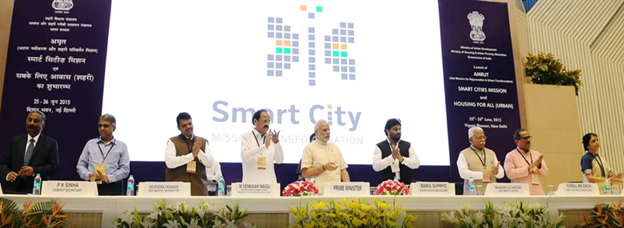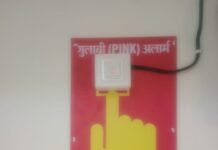
Union Minister for Housing and Urban Affairs and Petroleum and Natural Gas Hardeep S. Puri apprised the members of the consultative committee of the Ministry of Housing and Urban Affairs about the progress of Smart Cities Mission.
He further stated that the implementation of the Mission at city level is done by a Special Purpose Vehicle (SPV), playing an instrumental role in monitoring the projects to utilize the full potential of this path-breaking mission. The Minister stated that India’s urban future will draw heavily from the innovations being nurtured in these 100 smart cities.
Smart Cities Mission launched on 25 June, 2015, is aimed at providing core infrastructure, clean and sustainable environment and a decent quality of life to their citizens through the application of ‘smart solutions’. 100 cities selected through a two-stage competition to be developed as Smart Cities are showing satisfying progress.
Smart Cities Mission, monitored by an Apex Committee headed by the Secretary, Ministry of Housing and Urban Affairs, regularly report implementation status of projects through the Real Time Geographical Management Information System (GMIS). As per SCM Statement and Guidelines, a Smart City Advisory Forum (SCAF) is established at the city level to advise and enable collaboration among various stakeholders. It consists of Member(s) of Parliament, Member(s) of Legislative Assembly, Mayor, District Collector, local youth, technical experts, other stakeholders, etc. All 100 Smart Cities have established their SCAFs. So far, the Smart Cities have convened more than 756 meetings of SCAF.
Moreover, at State level, High Powered Steering Committee (HPSC) chaired by the Chief Secretary has been established. Besides, Ministry of Housing and Urban Affairs Nominee Directors on the Boards of Special Purpose Vehicle (SPVs) regularly monitor the progress in respective cities. Furthermore, the Ministry regularly interacts with the States / Smart Cities through video conferences, review meetings, field visits, regional workshops, etc. at various levels to assess the performance of cities and to handhold them for improvement.
Further, the Committee visited various project sites including ‘Mandovi Riverfront Promenade’, ‘Flood Mitigation Works’, and Integrated Command and Control Centre in Goa and deliberated upon the current status and progress as on 1 May, 2023 wherein it was highlighted that the Mission has around 7,800 projects worth Rs.1.8 lakh crores of which 5,700+ projects (73% by number) worth Rs. 1.1 lakh crores (60% by value) have been completed. All remaining projects are expected to be completed by 30 June, 2024. Also, it was outlined during the meeting that ₹38,400 crore have been released under Smart Cities Mission upto 1 May, 2023, out of which ₹35,261 crore has been utilized.
The meeting chaired by Hardeep S. Puri, Minister for Housing and Urban Affairs and Petroleum & Natural Gas. Sh. Kaushal Kishore, Minister of State, MoHUA; Members of Parliament from across the States, MVV Satyanarayana, AKP Chinraj, Ramesh Bidhuri, Sanjay Kaka Patil, Abir Ranjan Biswas, Kalpana Saini, Vandana Chauhan and other senior officials from the Ministry of Housing and Urban Affairs, GoI, attended the Parliamentary Consultative Committee meeting, here last evening. Shalini Agarwal, Commissioner, Surat; Sh. Divyank Singh, CEO, Indore Smart City; M. Prathap, CEO, Coimbatore Smart City; Ankit Khandelwal, CEO Agra Smart City, also made insightful presentations on best practices adopted in their respective cities.
The Minister of State, Sh. Kaushal Kishore lauded the pioneering effort of the Mission in successful deployment of the Integrated Command and Control Centres (ICCCs) in all 100 smart cities. “ICCCs build better situational awareness by the use of cutting-edge technologies and provide consolidated visualization for civic officials across urban functions to handle day-day work/ issues/ exigencies through detailed SOPs”, he said. He further added that ICCCs have become the nerve centres of these smart cities and embodies effective use of technology towards strengthening the urban management.
Furthermore, Kalpana Saini stressed on the need of adding more to Smart Cities Mission; whereas Vandana Chauhan appreciated ICCC’s and their functioning during COVID-19 and other crises for effective management of the pandemic, AKP Chinraj stressed on the need for creation of expertise in crucial areas such as mobility, water and waste management, etc. in these cities, Ramesh Bidhuri lauded effective implementation of smart city initiatives pioneering frameworks like the Ease of Living Index and the Climate Smart Cities. Further, in order to foster outcome-driven works, he outlined the need of extensive publicity efforts for amplifying exemplary pivotal initiatives of this mission.
The enactment of the Smart Cities Mission, marked the beginning of a new era in Urban Development Sector as a step towards reforming the sector, encouraging improved economic standards, smart governance, climate-sensitive sustainable environment, vibrant public spaces, digital access and health & hygiene, thus empowering the cities framework. Ministry of Housing and Urban Affairs, Government of India is committed to enhance the ease of living index in the service of citizens.



